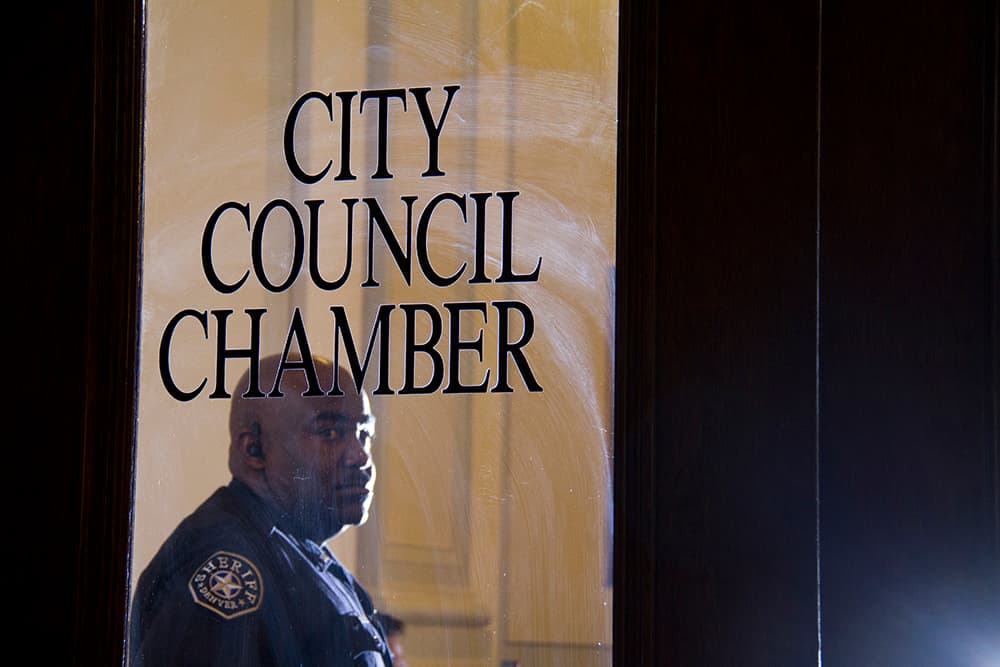The latest bid to strengthen the city council and decentralize power in the mayor's office came from Councilwoman Candi CdeBaca, who on Tuesday floated two ballot measures: one that makes Denver's police and sheriff watchdog independent from the mayor and one that draws a thicker line between the mayor and the city attorney.
CdeBaca's colleagues voted to kick both proposals back to committees to vet and revise them, likely ending any chance of them seeing the ballot in 2020 because of filing deadlines.
Denver's head of the Office of the Independent Monitor oversees internal investigations of the police, sheriff and fire departments, and shapes policy on things like use-of-force, discipline and training. The mayor appoints that position because the city charter says so. Voters would've decided in November whether to empower city council with that appointment instead.
When members of the public allege abuse of power by police officers, sheriff deputies or firefighters, law enforcement departments investigate themselves with oversight from the monitor. But if you follow the chain of command, every player in that scenario answers to one person: Mayor Michael Hancock. He appoints the chief of police, sheriff and fire chief, as well as the monitor.
The current setup is too close for comfort for CdeBaca, an outspoken opponent of Hancock and some of her colleagues.
"There is no independence that is embedded into the independent office," she said. "This is not to change who the monitor is, but to change who the monitor's boss is, and that is critical if we want to change investigations, if we want to change outcomes of things going on in our city right now."
Council members voted 9 to 3 to send the bill back to committee, with Jamie Torres, Kevin Flynn and Amanda Sandoval voting against, and Amanda Sawyer, Kendra Black, Jolon Clark, Chris Herndon, Chris Hinds, Paul Kashmann, Debbie Ortega, Robin Kniech and Stacie Gilmore voting for the move. CdeBaca abstained.
Most council members said they agree with the bill's intent but could not pass the measure onto voters because they did not have enough time to examine the bill and bring it to their constituents. CdeBaca filed the bill directly without going through the typical committee process.
"A charter change is serious," Ortega said. "This is where details matter, and there's a lot of details that need clarity and answers."
Council members disagreed on various things, including details about whether the monitor should appoint some employees or not.
Independent Monitor Nick Mitchell didn't publicly support the ballot measure's primary goal, citing a conflict of interest because it relates to the hiring and removal of the position he holds. But Mitchell said he was "generally supportive" of anything that ensured the public had "strong faith in the monitor."
Mitchell supported another piece of the proposal that would have made employees in the Office of the Independent Monitor "career service" workers, meaning they would get the same protections enjoyed by most other city employees. When the office was created in 2004 under then-Mayor John Hickenlooper's administration, employees were not given union-like protections for things like discipline, suspension or termination.
"They take tough positions on tough cases with the departments they oversee, and I want to make sure that they have workplace protections," Mitchell said.
The other measure sent back to committee would have given city council more say in who Denver's top attorney is.
CdeBaca sponsored this one, too. It would have created a committee to nominate the head of the City Attorney's Office, which vets legislation and contracts, advises elected officials and handles claims against city employees -- including police officers, sheriff deputies and the mayor -- among countless other legal matters.
The mayor unilaterally appoints the city attorney under the current city charter, which CdeBaca wants to change because she said the current system breeds conflicts of interest. Her ballot measure asked voters to create a seven-person committee to diversify the process.
"We have no neutrality in the way that we're being represented," CdeBaca said.
She said the measure would make the city attorney more independent. She takes issue with the position "serving at the pleasure of the mayor," as the charter puts it, while also advising the city council on its activities, which sometimes counter the mayor's priorities. For example, the setup might've produced a conflict of interest when the council considered an investigation into Hancock's sexual harassment scandal, 9News reported.
Council members Kniech, Hinds, Ortega, Sandoval, Sawyer, CdeBaca and Torres voted to kick the item back to committee. Council members Clark, Flynn, Kashmann, Black, Herndon and Gilmore voted not to.
Mayor Hancock was against sending the ballot measure to voters. Spokesman Mike Strott said the idea is a "solution in search of a problem."
Although the council's legislative attorney works for the City Attorney's Office, she has an ethical obligation to serve the council as a body, said Skye Stuart, Hancock's legislative director.
Council members said they have similar goals as CdeBaca, but many cited her approach as an issue. She filed the bill without sending it through the typical process of multiple committee meetings, which several members said did not give them enough time to vet it and share it with their constituents.
"We should fully understand items before we send them to the voters," Sawyers said. "As much as I do support this and as much as I think a conversation needs to happen, that conversation hasn't happened yet."
CdeBaca said she felt "weaponized" by the process. Flynn said she was "weaponizing chaos" as the city faces a civil rights movement and deals with an economy-crushing pandemic.













